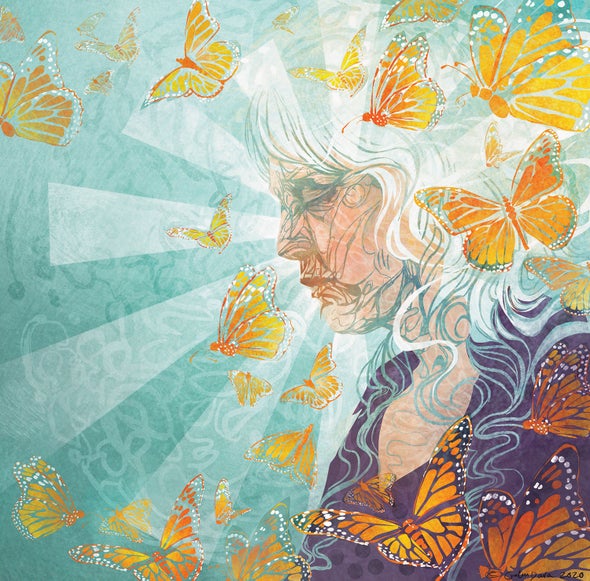I have learned that when someone you love has Alzheimer's, he or she is not the only one facing memory issues. Do we remember the bright, sunny person full of life and creativity, or do we remember the person who no longer recognizes us, who lies in a bed in a nursing home, gasping for air? Do we remember the lover with whom we could share our body, our thoughts and our adventures or the person who cannot finish a sentence or find the bathroom? How do we live with the fact that the individual actually died years before his or her body stopped? The ghastliness of Alzheimer's seems to push out everything else. I am finding it hard to remember ordinary life with Carol before Alzheimer's.
My wife, Carol Howard, was diagnosed with early-onset Alzheimer's in her early 60s. I slowly watched her disintegrate, watched her beautiful mind be deconstructed part by part, watched sentience slowly fade until she was, well, not here.
When she learned the diagnosis, she was determined to fight the disease. She enlisted in two clinical trials of potential drugs, both of which failed. When we realized what was inevitable, she told me that she wanted me to scream for her when she was gone. She was angry that several decades' worth of Alzheimer's research had produced no hope. There is no cure; there is no good treatment.
I will tell you who she was and what she became. She was a woman of great beauty, with eyes of summer-sky blue. She was peaceful and brilliant, gentle and kind. I met her when she took a science communication course I taught at the University of California, Santa Cruz. She always put the right word in precisely the right place. Carol studied marine biology and wrote a popular book about her doctoral work with two Atlantic bottlenose dolphins. For 15 idyllic years we lived in the redwood forest of the Santa Cruz Mountains, writing. She eventually moved with me to Baltimore and worked at the Center for Alternatives to Animal Testing at the Johns Hopkins Bloomberg School of Public Health, an excellent job that she loved.
About six years ago odd things began to happen. Carol blacked out occasionally. Her libido disappeared. One night she sat in front of her office computer weeping because she had forgotten how to download a file. She stopped reading books. Soon there was medical testing, and then the dreadful diagnosis.
She still loved walking, but she started getting lost, so I gave her a GPS tracker. When she could not find her way on her own, I would fetch her, or one of our neighbors would bring her home. One time she got out of the house (which had not been locked properly) and started shrieking in the street. At a family Thanksgiving gathering she left our bedroom and walked about the house naked. When things got worse, she would sit for hours in a living room chair, staring at nothing, the light in her glorious eyes dead. I would talk to her, tell her about my day, without the slightest reason to think she heard me or would respond. There were two of us in the house, but I was alone.
In January last year I fell, broke my knee and several ribs, and had to be taken to a hospital. Our daughter, Hannah, knowing neither she nor I would be able to take care of her mother, found a good nursing home for Carol that took Medicaid. I recovered and regularly visited her twice a week, monitoring her decline. She once thought I was her father. On two occasions I saw her physically resist help, showing a fierce aggression I never thought possible in her.
The end is an image that will not go away. At noon on October 25, 2019, with Hannah and a friend holding her hands, Carol raised her body slightly, made a gurgling sound and fell back, dead. I closed her eyes. It was a month before her 70th birthday and a month before our 28th anniversary.
One result was financial disaster—the only possible end for many Americans in our dysfunctional health care system. We had to hire lawyers to handle the legal issues ($12,000). I was told that to pay for Carol's nursing home, which cost about $80,000 a year, I had to impoverish myself to qualify for Maryland Medicaid: our attorneys said that I could have no more than $2,500 in the bank. We had to spend Carol's retirement funds, and I had to give up our house and move into an apartment. My life now is upside-down.
So how do I remember her? Her decline and death are more recent, so they are naturally stronger memories. But how do I deal with the horror and indignity of Alzheimer's? The eyes whose light had dimmed? The soiled diapers? The unfinished sentences? The empty bank account? The anger?
I should remember this: Three and a half years ago, before Carol's decline became precipitous, I found out that the Royal Concertgebouw Orchestra, one of the world's best, was playing my favorite piece of music—Gustav Mahler's Resurrection Symphony—in Amsterdam. Carol agreed that we had to go.
The concert was stunning. Afterward we walked, holding hands, across a grassy park in a light mist that muted the great city. Carol said not a word. I could tell from her face that she was present and aware and, better yet, that whatever Mahler was saying in his passionate music, she had understood. He had gotten through to her. Scientists say music appreciation is one of the last things to go with Alzheimer's because of where it is processed in the brain.
It was the last time we made love and the last time I had Carol back for any length of time—the living, wise, beautiful Carol. The Carol of the summer-blue eyes. I keep reminding myself.


